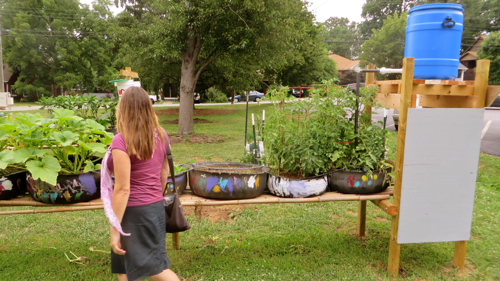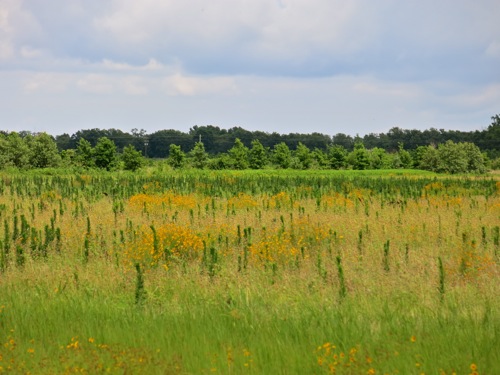Carol went off to visit her co-author Dave, while i wandered around downtown Asheville. I liked Malaprops bookstore, and I liked the public library (which has a good used bookstore), but the rest of downtown Asheville seemed to me to be dominated by two kinds of people: white middle-aged and overweight tourists who lumbered from gourmet restaurant to fancy gift shop, and white twenty-somethings who asserted their individuality in anxiously loud voices.
Carol picked me up, and we began to drive back to our motel when we saw a huge garden, half an acre or more, in front of Grace Covenant Community Church, Presbyterian Church USA. We decided to stop and walk through the garden.

Above: Community Garden at Grace Covenant Church PC-USA, Asheville, N.C.
We saw tomatoes, squash, beans. A woman who was also walking around stopped Carol and said, “What is that?” Carol looked and said, “I think it’s watermelon — something in the squash family, probably a melon.” We asked her if she were part of the church, but she said, “No, i just love looking at this garden, and since I had a few free minutes, I thought I’d walk around in it.”
I went in and asked in the office about the garden. Leah, one of the church staff members, told me that seventy percent of the harvest goes to alleviate food insecurity in the region. It is a cooperative project with church members, and members of the wider community. She gave me the email address of someone who was instrumental in making the garden happen.
Just outside the church office was a “World Garden,” a demonstration garden showing tire gardens and bag gardens to grow a lot of food in small spaces.

Above: “World Garden” at Grace Covenant Church PC-USA, Asheville, N.C.
We made one more stop before we went back to the motor court for dinner: the giant Goodwill store in Asheville. We skipped the furniture outlet and went in the retail side. I looked at their used books while Carol shopped for t-shirts. They had an eclectic mix of books: a book on choral conducting, several copies of Stephanie Meyer’s Twilight series, Great Expectations by Charles Dickens, a book about schnauzers, a children’s book of train stories which I had read as a child; I bought a cheap science fiction paperback.

Above: Interior of Goodwill retail store, 16161 Patton Ave., Asheville, N.C.


